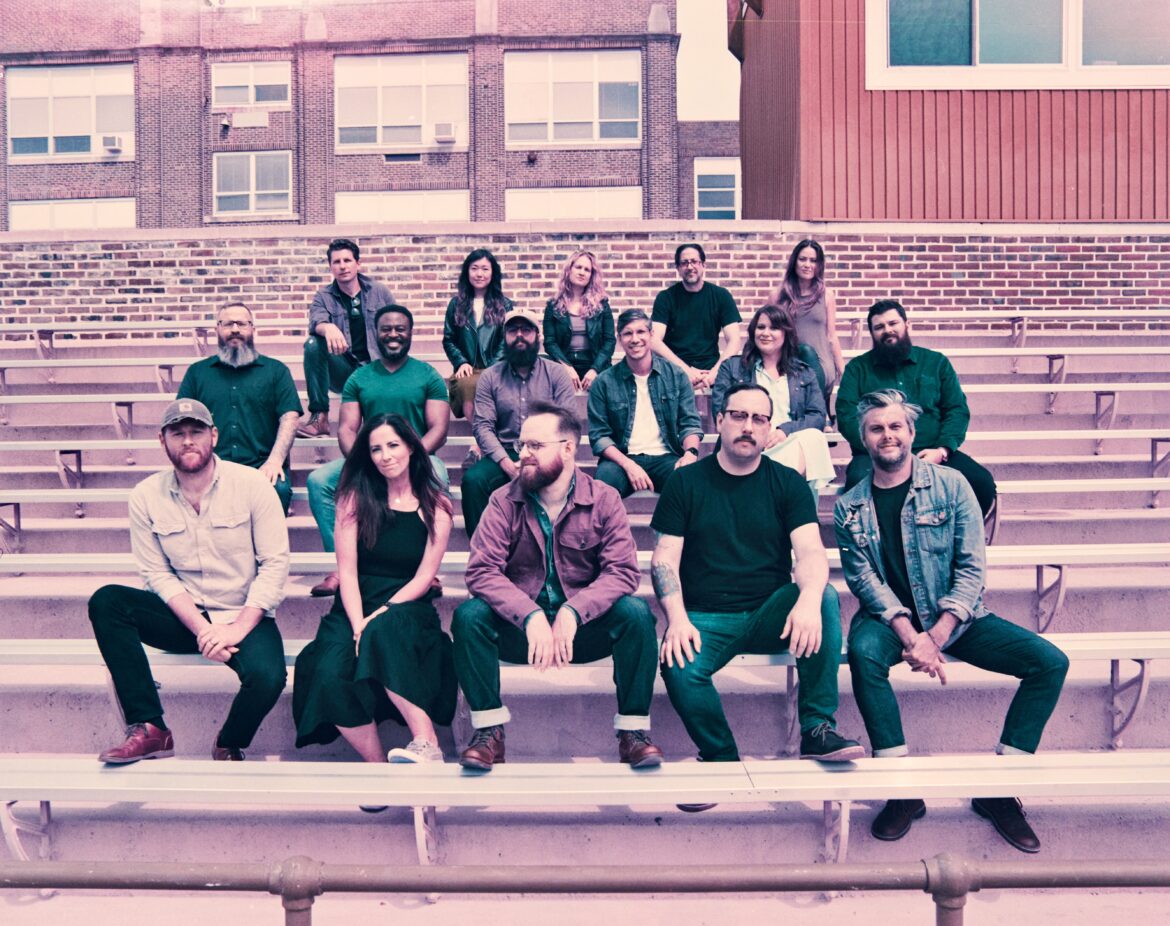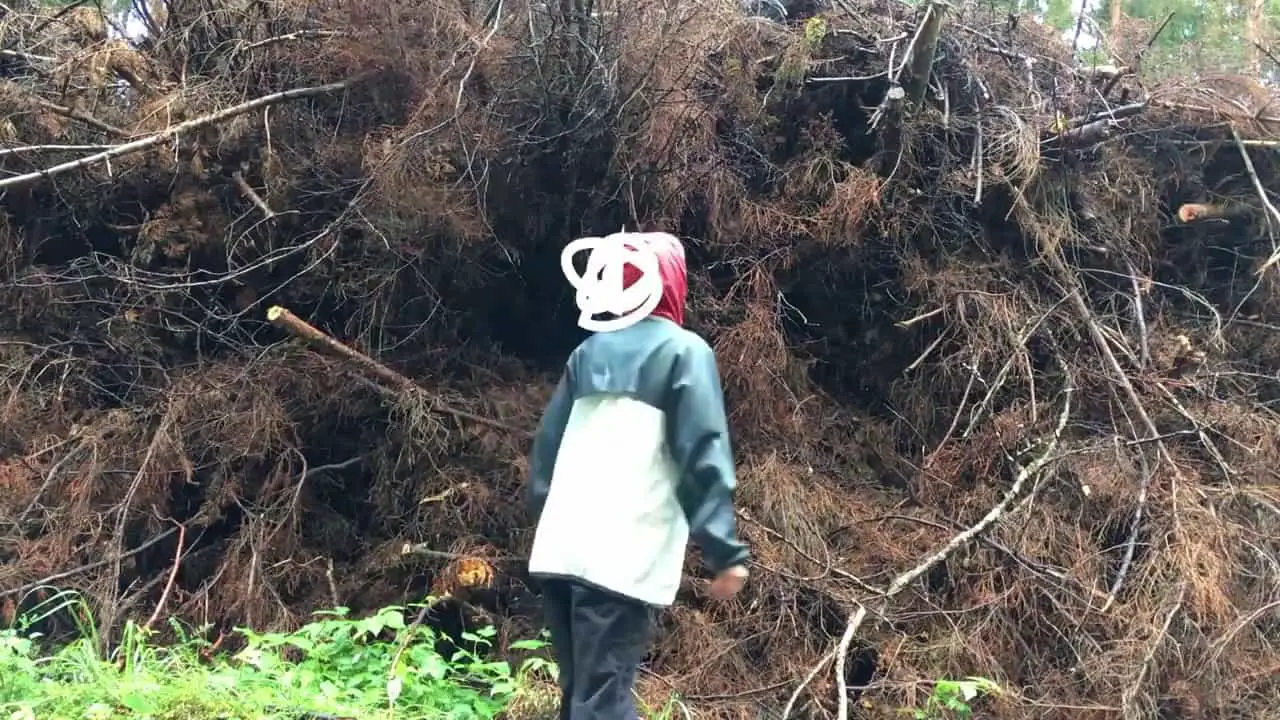Dan Campbell discusses ‘In Lieu of Flowers,’ the cathartic third album by Aaron West and The Roaring Twenties – and a record of reunion, reconnection, and healing.
Stream: “In Lieu of Flowers” – Aaron West
Sometimes, the healing can be the hardest part of the journey.
Even after the initial damage has long since passed, the scab can still get picked at and leave a lasting mark that can lead to some bitter consequences. On In Lieu of Flowers, protagonist Aaron West takes the steps to mend wounds a decade deep with the help of his amazing backing band, The Roaring Twenties.
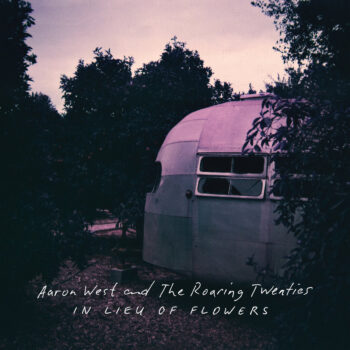
First introduced to fans in 2014’s We Don’t Have Each Other, Aaron West is the creation of Wonder Years vocalist Dan Campbell. Campbell initially wrote the record without any expectation that it would lead to follow-ups. On the debut record, fans follow Aaron as he navigates grief following the death of his father, miscarriage of a child, and his wife Diane leaving him.
The follow-up Routine Maintenance (2019) sees Aaron run off to Los Angeles after a bar brawl gone awry, make new friends, form the band, and re-connect with his sister as he takes on a mentor role with his nephew. When performing live for Aaron West, Campbell performs in character, whether he’s solo or accompanied by The Roaring Twenties.

While there are clear plot points on the albums, this is a story that’s just as informed by the live experience.
Aaron shares details about his life and the songs through his stage banter, and as Campbell explained to Atwood Magazine in a Zoom interview, sometimes what happens in the real world ends up affecting the story that gets set to tape.
“I don’t think that there are a lot of really easy parallels to this in music, and so, obviously there are plenty of people who make concept records. I think that there are probably people who perform on stage, but I don’t think that there’s a whole lot of artists that are doing one long 10-year performance, where everything is canon and everything is germane to the narrative,” he says.
In Lieu of Flowers picks up shortly after the release of Routine Maintenance. “The first song you hear on it begins in June of 2019, and the last song you hear on it is in November 2023,” Campbell tells us. Throughout that four-year timeline, Aaron reunites with the band, navigates lockdowns from the COVID pandemic, reconnects with a potential romantic partner, picks up drinking again, gets sober, and eventually lands in a healthier place in his life.
Hold on, the wound is gonna mend
And when it’s all gone, I’ll write in wet cement
In lieu of flowers, shake the dirt off
I’m with you till the bitter end
From the bombastic Springsteenian folk punk of “Roman Candles” through the down-trodden country ballad “Whiplash” into the folk ballad “Dead Leaves,” Campbell packs an emotional punch in the latest chapter of Aaron’s journey. While In Lieu of Flowers has some of Aaron West’s darkest moments, it’s ultimately the most uplifting of the trio of records, bringing a calming final moment to his saga.
Dan Campbell spoke to Atwood Magazine about crafting In Lieu of Flowers, real life affecting the story, and how he led Aaron to healing.
In Lieu of Flowers is out April 12, 2024 via Hopeless Records.
A CONVERSATION WITH DAN CAMPBELL
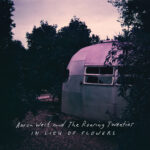
Atwood Magazine: When people talk to you about Aaron West, do they mostly ask you about plot or the music?
Dan Campbell: I think it’s pretty even. I used to have a lot of trouble figuring out how to do Aaron West interviews, because like, “Do I do it in character?” When I answer Wonder Years questions about a lyric, I answer them, because I know it, because it’s my life. So like, could I do that? The realization I had was I’m trying to look at it like it’s a television show, and I am the writer-director. So I can answer questions about plot or narrative or lyrics or music or anything, because I kind of oversee and orchestrate everything.
When you set down to write an Aaron West record, how much of it is plot-oriented where you’re thinking, ‘I want these things to happen,’ or is it more ‘I’m going to sit, play the songs, write it,’ and try to write out the storyline later?
Dan Campbell: They’ve been different. The first record lived without any expectation, and so I kind of knew the narrative beats that I wanted to hit, and I was just trying to—I remember when I first pitched this to the label I said, ‘I promise I’ll learn how to play the guitar.’ A lot of it was just trying to figure out songwriting from a mechanic standpoint with a guitar in my hands, a thing that I hadn’t really done previous to that album.
When I went to tour the record, I had that first realization that like, ‘Hey, it would be weird, I think, to play these songs, and then jump out of character and do banter as me, and then jump into character and do a song, and then jump out of it.’ So, I thought, “Let’s just do the whole set in character.” It wasn’t super fleshed out as an idea. I just felt like it was going to make the set feel more natural, and I don’t expect to play a lot of shows anyway.
Then, I did play a lot of shows, and people really liked it. I didn’t expect to make a second record, but then, I think there has to be dueling demands for it. There has to be my demand for it: I have to want to create songs and think that I have songs worth people listening to, and there has to be people that want to hear it for me to go out and do the thing. So both of those things were true, so I thought, ‘Okay, it’s time to make a second record.’
I have, in some ways, constricted my options, because I’ve stood on stages and said “My name is Aaron West and these are the Roaring Twenties.” So now, that is fact. That’s like an indelible part of the story is: this is a guy that plays music, and he plays it all over the place. So that had to be written into the narrative. I realized that it has to run parallel to the actual timeline. If I was on tour in X city on X day, I cannot have on the album the character living somewhere else on that day. He can’t be in Peru, hiking in Machu Picchu if people saw you onstage in Chicago that day.
I drew all of these calendars and marked off the days where I was different days, and I found a way to make the narrative weave through that. This third record, I realized that that wasn’t exclusively to my detriment, that I could use that to my advantage too. That I had this other realm outside of the album where I could tell the story. I could tell the story in front of you, live in real time. So I started scripting the story much earlier.
We had plans to roll that story out on stage in front of you, and I would talk about things in the banter that would become part of the story later. We would set up events that would happen, and it would become part of the story later. So, that was a big part of this one, but then also when you’re doing something like that, you’re at the mercy of the universe, and the universe just crushed us.
I don’t know if you’ve heard about it, but there was this like f*ing global pandemic, and that derailed a lot of what we had. So we kind of had to be on our feet, right? I had narrative. I had an idea of where the character was going, where the story was going, but we have to be malleable. We have to be able to change with the wind.
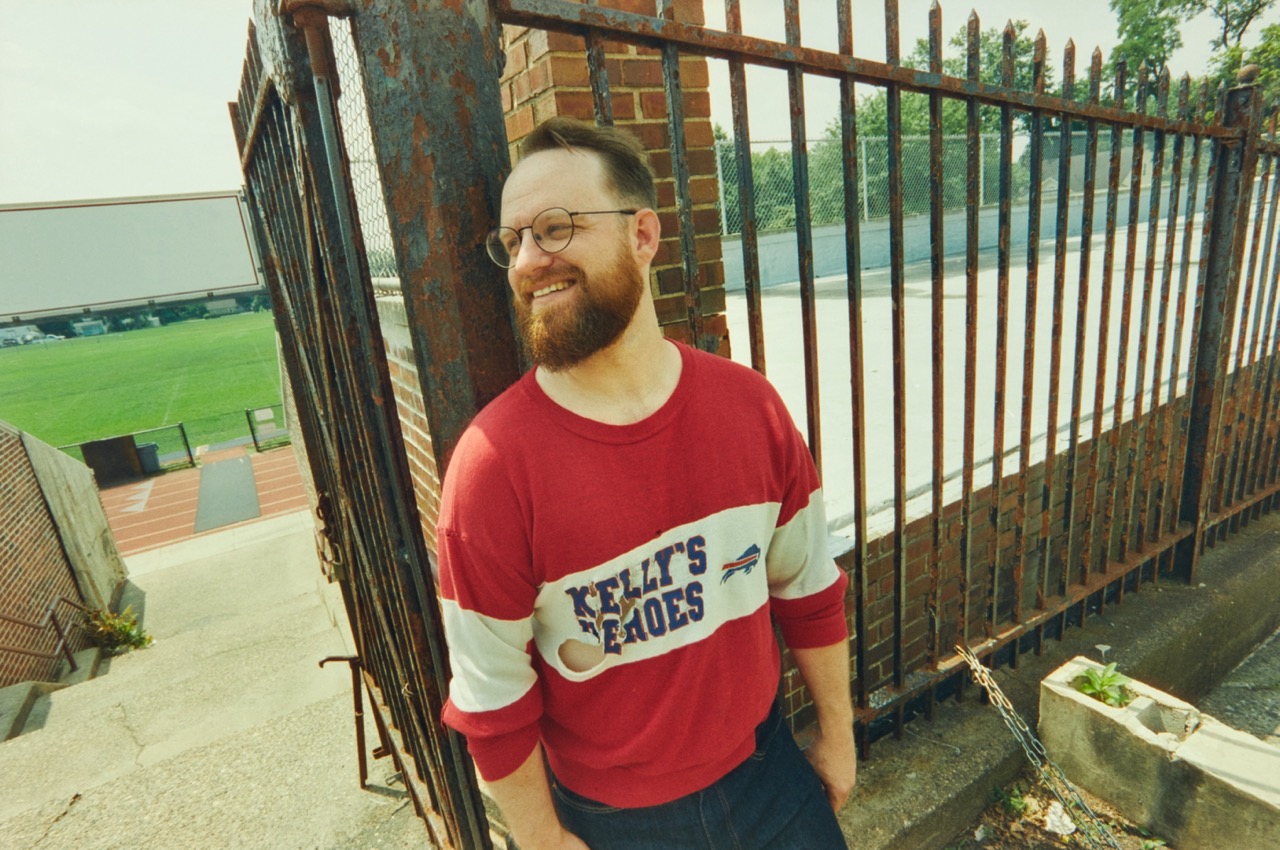
What were some of those things that you had planned?
Dan Campbell: The first one is the thing that happens in “Smoking Rooms,” which is at the end of Routine Maintenance, Aaron has left the band to care for his family, but the record came out. So you have to tour on it. I think that Aaron as a person, just trying to know the character well enough, I know that he is the kind of person that would feel an obligation to the people that released the record to do the job of promoting. So even though he is no longer with the band, and they’ve had to move onto different things in life, he still feels like he has to go on tour solo, and we did those tours in 2019.
I booked what was slated as a solo set playing the record in Asbury Park, and I started to hype up the fact that Aaron’s sister Catherine was going to come and play a cover song with him, but what we actually did was after that song the band surprised Aaron and came on stage and re-joined and the Roaring Twenties came back together. This time with Aaron’s sister playing piano. That was like the first event that we set forth.
So, we had all of these ideas about going on tour, and then the pandemic happened, and we had to figure out where the story goes now.
Knowing that you were thinking about that even five years ago is really interesting. I had heard that there was a festival in the U.K. where there was something that had happened to Aaron West during a set. It seemed very in character, setting up the record, but nothing had been announced yet. So it was very much like, ‘What’s happening?’
Dan Campbell: “Spitting in the Wind” takes place at the Peppermint Club in L.A. where we were on tour, probably 13 months ago right now, and the label was at that show. Aaron freaks out on them in front of people, screams at the record label, and it happened. We did it. I crumbled the setlist up and threw it in the Director of Streaming’s face. They were at a VIP table right off the thing. We set that whole thing up to further the storyline.
When I was on stage at 2,000 Trees, I was like, “Hey, I kind of f*ed up our deal, and I don’t know if we’re going to get to make another record, and so if you could maybe help, and send them a little message.” So yeah, there were like hundreds of messages flooding the Hopeless Records’ [social media], and directed it at their head of A&R. They were like, “Why wouldn’t you put out this record? You should really do it.” Some were nice. Some were not so nice. Their social manager who did not know I was going to do this was probably like “What is happening?”
I coordinated these events to happen in front of you as part of the narrative arc.
I’ve always felt like getting to hear the stage banter and the stories in between the songs was an integral part of the Aaron West experience. As part of the project, you’re also putting out a diary of everything that’s happened to Aaron. Is it exciting for you to get to fill in gaps and give new background to people?
Dan Campbell: It’s both exciting and a little intimidating, because you sit there and you write 7,000 words. I think the journal ends up being 24, 25 pages. It’s pretty hefty as far as a bonus add-on to an album goes. Just being like, “Am I maintaining the voice correctly? Is everything perfectly aligned in canon?” Again, I’m checking calendars. “Is this the right date for this thing? Would this have made sense here? Wait, no. That’s the wrong year!” We have such an eagle-eyed fanbase that I’m hoping that I nailed it. I really put a lot of time and energy into it. Everything I’ve ever done, you look back on it and go, “Oh f*. Look at that typo! Or damn it, this thing.” In that way, it’s intimidating. For the people that love the story, the stakes are pretty high, right? I can’t phone shit in. I have to do things the whole way. So I put a lot of time and energy into it, and I hope that it’s well-received.
Something that comes up later in the album is when Catherine mentions that Aaron’s dad’s death was alcohol-related. Even though we know Aaron’s dad had died in the first album, how much of it were you thinking of when you made We Don’t Have Each Other versus how much you’ve thought of along the way?
Dan Campbell: I think that I always thought that it was probably due to drinking. You set it up kind of early on that first record where he hasn’t been drinking really since college, and his ex-wife is like, “You’re boring now.” There’s that line in “You Ain’t No Saint.” Or is it in “Grapefruit?” I think there might be one in each.
If I start drinking, I’m gonna be the town drunk
You always said I should lighten up
I’m gonna lighten up
I think there is a line in ‘No Saint’ too.
Waking up drunk, sleeping through your early classes
I grew up and grew dull
And you said you wish I hadn’t
Well, I’m drunk again
And you’re guilty like you’re Irish Catholic
It kind of happens twice in that where he wasn’t really drinking. I think I always knew it was because he watched his dad slowly erode from drinking, and then I didn’t think I’d make another record. So it was a thing I knew, but it was not explicit. I thought that this was the time to understand the generational implications of it.
As someone who doesn’t drink, what was it like for you to explore that from a sober perspective?
Dan Campbell: I am someone whose family has been impacted by drinking quite a bit, so I’ve kind of watched what that looks like when people slowly kill themselves with it, and I’ve watched what that looks like when people f* up their lives because of it, but there were things that I just could never understand by just bearing witness to.
So I started interviewing people in my life that are in various stages of their journey with sobriety and asking them, “How does this feel? How does that feel? Can you describe this situation? Would you say that this is an adequate explanation for it? I wrote this lyric. Does that feel true to you?” Even so far as doing a long interview with my friend Bobby for “Running Out Of Excuses” and being like, “Tell me about the experience of rehab, down to what the walls look like. What does the furniture look like? I want to know everything.” Taking copious notes.
First of all, basking in the generosity of these people and their willingness to share their stories with me and allowing me to weave it into this, and trying to make sure that I do justice by it, these heavy topics. That’s what writing is, right? You can’t only write your life. You have to move out. If you’re going to do it, I feel like you should put the effort in to respect the struggle, and do it in a way that feels visceral and real and true.
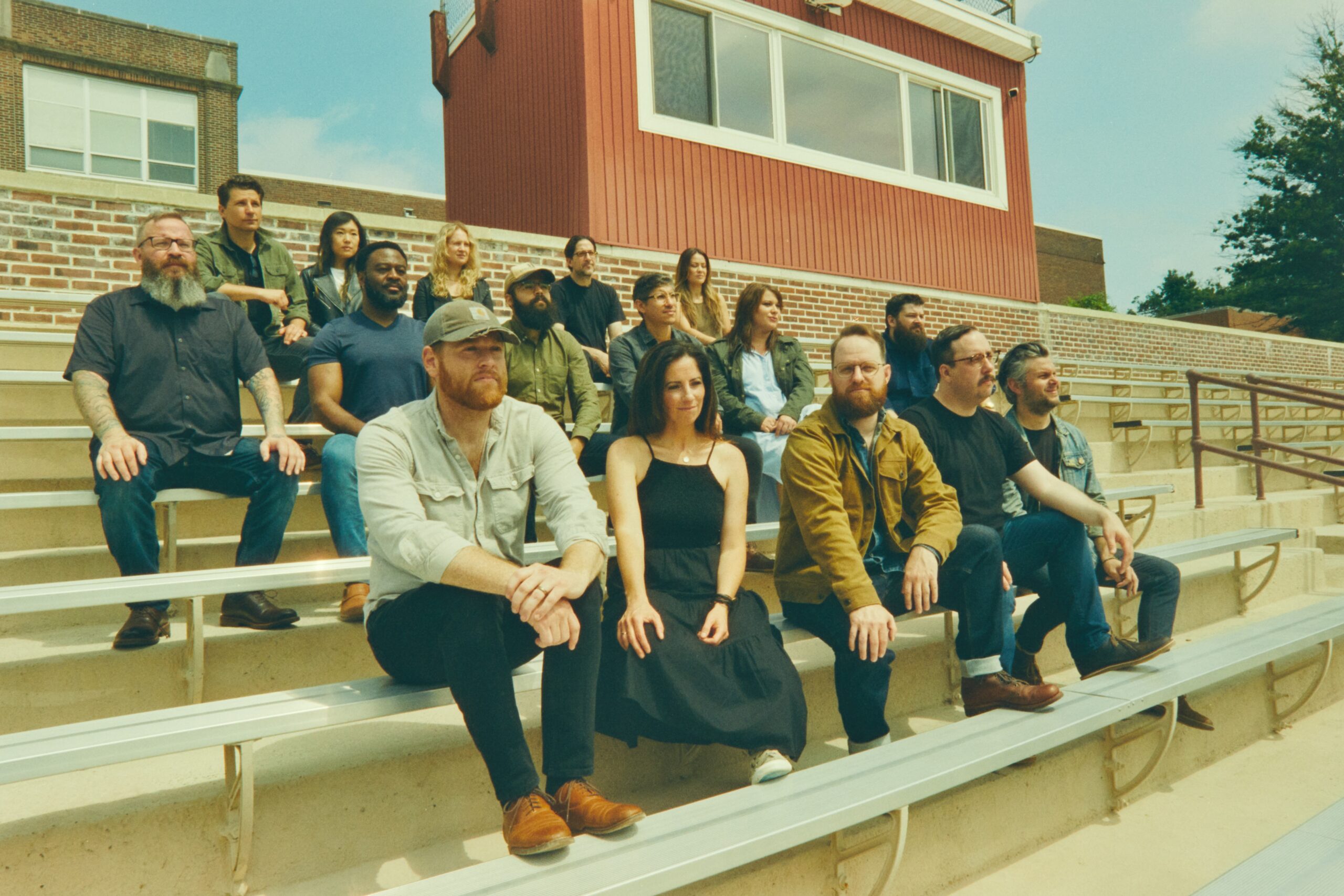
Does performing as Aaron and going through these huge life events as him take an emotional toll on you?
Dan Campbell: I think the hardest thing for me is that I’m not an actor. I want it so bad. Not to be an actor, but I have these visions of this project and what I expect it to be, and so, it’s put me in a position where I have to try and inhabit that space. It’s mentally taxing, because it’s not in my skillset. I’m really stretching myself to try and do it. Depending on how the day has gone and how busy it’s been and how much time I have to prepare and inhabit that headspace, it can be easier or more difficult. There’s definitely shows where you hit a bunch of traffic, you get there late, everything’s rushed and compressed, and I’m having a lot of trouble getting myself in the correct space to be convincing.
My friend Charlie is an actor and a voice actor, and he’s come to some shows, and I’m like, ‘Hey man, does this feel real to you? What could I be doing better here?’ And getting notes and trying to improve. It’s a whole thing. I’m trying to be better every show: better at guitar, better at singing, better at acting. The whole thing!
Spoiler warning. Jumping to the end of the album, Aaron runs into Diane again. It feels like he gets a sense of closure in that relationship. Why the decision to bring her back?
Dan Campbell: I think that it’s multi-faceted. One of the things is that his arc has to be based on his consistency. He has to become a more consistent person for the people in his life. In order for there to be any kind of forgiveness and redemption, he doesn’t have to show up once and make a grand gesture. He has to show up again and again and again.
So you have this situation where he is about to go play this show with his record label there to try to prove to them that it’s worth putting out a new record. It’s worth letting Aaron West and the Roaring Twenties make what turns out to be In Lieu of Flowers. Riding on that are the lives of basically his entire chosen family: his sister and his bandmates and his nephew. It’s important to all of them. Putting him in a position where right before going into that, he is shown the thing that could cause him to break down and blow it all up again, and then choose instead to be someone reliable and turn around and walk toward a future. I think was really important.
It is also about closing wounds. The record in large part is about doing the work to close wounds. I think for a lot of Routine Maintenance what he did was ignore them. Was to say, “I feel okay now, so I don’t have to do anything about it.” That comes back to haunt you. The easy way out of things: The fast track, the express lane is not always going to be as useful, functional, helpful as doing it the hard way, doing the actual work the whole way through.
This record — a lot of it — is about doing the actual work to close these wounds and to see her and to see her with a kid and then instead of feeling sadness or bitterness or dejection, to feel happy for her, because he’s comfortable in his life and then go move forward in a way that demonstrates that people can rely on him, I think that was really important to come from and where he’s going.
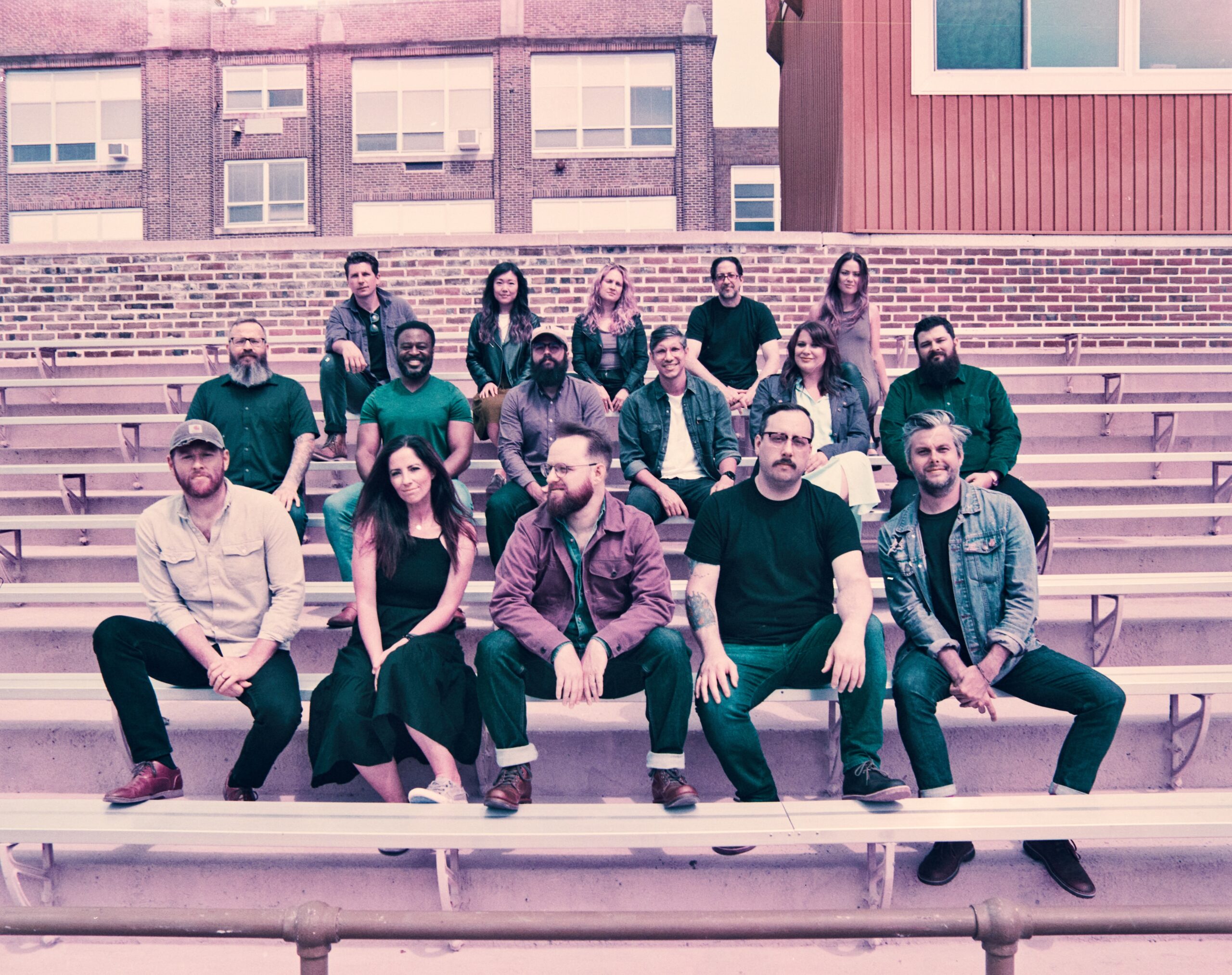
I saw Aaron West at Le Poisson Rouge in 2022, and one of the moments that stuck out to me and put the scope of the project in perspective was someone called out something about Diane, and you said, ‘That was almost 10 years.’ I realized that it was 8 years ago at that point, and in 8 years, you hope that someone is over a breakup by then.
Dan Campbell: Yeah, and you hear it in “Monogahela Park,” where Sam asks if it’s weird for me to still sing about Diane, and I kind of shrug, “I mean, it’s really not up to me.” You play the songs you wrote. That’s the way it goes. You play the songs people want to ask to hear.
You’ve teased that this may be the end of the Aaron West saga. Even if it is the last of his story that we as listeners hear, what do you think comes next for him?
Dan Campbell: I don’t know. I haven’t really put a lot of thought into it beyond the fact that he walks in that door and plays the show, and is reliable enough that you have the record. So it worked. That’s all I can script, because everything is at the mercy of what happens. It exists in this universe. I could say that ‘I think that this thing is next,’ and then — f*ing Jesus Christ, I hope not — another pandemic. You never know! Anything is possible, and a lot of this stuff that we do, because it happens live, because it happens on tour is about rolling with punches. Seeing what we want to do and what the world gives us, and finding a path between those, threading the needle between them, I can’t speak on any future, because it has not happened yet.
— —
:: stream/purchase In Lieu of Flowers here ::
Stream: “In Lieu of Flowers” – Aaron West
— — — —

Connect to Aaron West & The Roaring Twenties on
Facebook, Twitter, Instagram
Discover new music on Atwood Magazine
📸 © Mitchell Wojcik
:: Stream Aaron West & The Roaring Twenties ::

